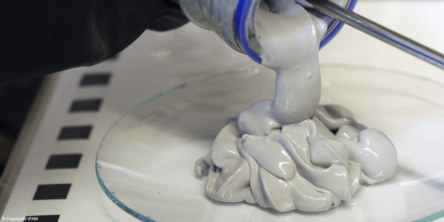Power Paste (Solid Magnesium Hydride)
Researchers at the Fraunhofer Institute for Manufacturing Technology and Advanced Materials IFAM in Dresden have developed a paste for hydrogen storage. The institute is calling the mass 'power paste'.
The researchers also claim their paste to offer high energy densities and be suitable for all vehicles from electric scooters to cars. According to Fraunhofer IFAM, the power paste, based on the solid magnesium hydride, should allow hydrogen to be chemically stored at room temperature and ambient pressure and rereleased as required. Since the power paste only decomposes above about 250 degrees Celsius, this works without any issues even if, for example, a scooter equipped with the paste is left in the summer sun for hours.
The storage paste’s starting material is only magnesium in powder form, which is a very common element. At 350 degrees Celsius and five to six times atmospheric pressure, this is reacted with hydrogen to form magnesium hydride. The power paste is then produced with ester and metal salt.
The power paste replaces the cylindrical pressure tank used in fuel cell cars and buses. Therefore, the institute says that this solution is suitable for hydrogen drives in smaller vehicles in cases where a pressure tank would be difficult to implement.
According to the Fraunhofer researchers, the refuelling process is straightforward. Instead of driving to a filling station, the scooter driver changes a cartridge and fills tap water into a water tank. In the vehicle itself, the paste is pressed out of the cartridge and mixed with a precisely measured amount of water, depending on the required power. This reaction produces gaseous hydrogen, which can then be converted into electricity for the electric motor.
Only half of the hydrogen comes from the power paste, the other half from the water in the reaction. 'The energy storage density of the power paste is therefore enormous: it is much higher than that of a 700 bar pressure tank,' says Marcus Vogt, a scientist at Fraunhofer IFAM. 'Compared to batteries, it even has ten times the energy storage density.' The Fraunhofer scientists even say that the driver should achieve a similar range with the power paste extrapolated to a car as they would with the same amount of petrol, if not greater"
